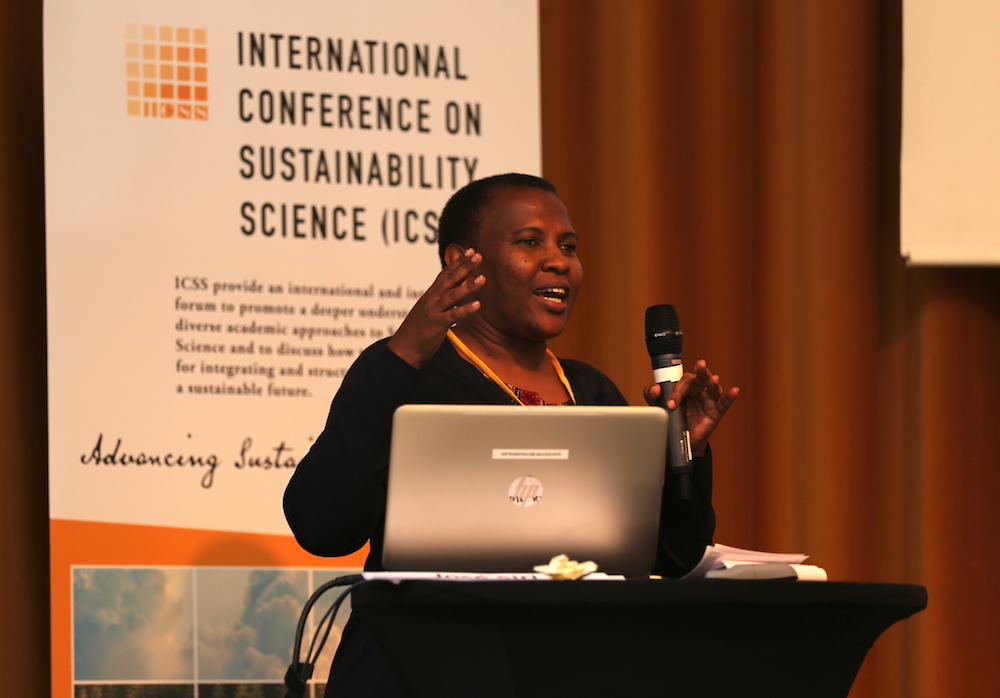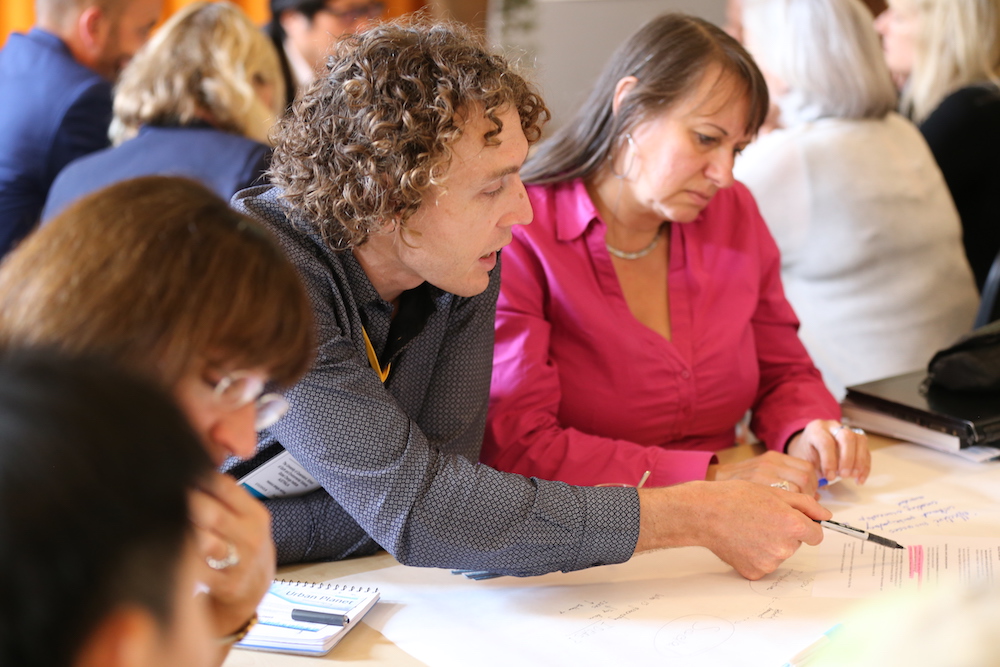Shall we grasp the unique opportunity for pursuing transformative development?
In August 2017, Future Earth co-hosted the 7th International Conference on Sustainability Science in Stockholm, Sweden. This event brought the research community together with diverse innovators outside of academia to address the challenges the world faces in implementing the United Nations’ Sustainable Development Goals (SDG).
As part of the conference, a handful of sustainability researchers and practitioners acted as navigators between conference sessions to connect the themes and thoughts shared by participants. Some of those navigators have worked together to produce blog pieces on how the world can engage all of humanity in meeting the 21st Century’s ambitious agenda for sustainability.
This conversation will also continue in May 2018 when Future Earth hosts the “Seedbeds for Transformation” conference, which will examine sustainable transformations in Africa.

Alice Ruhweza, Head of Sustainable Production at Conservation International – Africa Division, speaks during the 7th International Conference on Sustainability Science in 2017. Photo: Hideyuki Mohri
The United Nations’ 2030 Agenda for Sustainable Development, with its list of 17 Sustainable Development Goals (SDGs), has the potential to transform the futures of every country, not least those in Africa. The SDGs present an opportunity for the sustainability community to take several challenges more seriously than we have in the past. That means meeting the global commitment of Agenda 2030 to “leave no one behind” in realising the SDGs. This international initiative also demands that countries take a “systems” perspective toward sustainability, approaching the problems facing them, and the solutions to those problems, in a holistic way. Finally, to achieve these goals and create transformative change, the global community must initiate a learning process to understand its successes and failures and adapt accordingly. Together, these challenges represent entirely new territory for nations around the world and for researchers and others who are monitoring progress on Agenda 2030.
First, we need to better understand who has been left behind and why in our pursuit of sustainability. It’s clear that many have: While impressive progress has been made to reduce poverty in the last three decades, 12.7% of the world’s population remains in absolute poverty. Of those who escaped poverty since 1990, two in every seven are falling back into those conditions today. Women and girls, rural dwellers, indigenous peoples, ethnic minorities, people with disabilities, migrants and refugees and the LGBTI community are among those who have been systematically excluded from many global advances. These groups are up against barriers that are not purely economic, but political, social and cultural, as well.
Grappling with these barriers will require a fuller understanding of what marginalised groups themselves want, need and prioritise. Poverty and inequalities are multidimensional and, therefore, no one size fits all. “Leaving no one behind” concerns us all and requires that we face the challenges of the last mile, pockets of poverty and exclusion in specific locations and by specific groups, and listen to the voices of everyone. “Leaving no one behind” means that we can only consider sustainable development goals and targets as achieved if they have been met for every group within society. This is one of the most challenging features of the agenda. Even with all the best intentions and funding, there is no simple playbook on how to ensure no one is left behind. We’re going to need to build this playbook as we go.
Second, the time is ripe for working within the complexity of a systems perspective. Research into sustainability challenges, from a changing climate to inequality, has revealed a world where everything is connected and evolving and where unpredictability and risks cannot be eliminated. As a result, sectorial and compartmentalised policies are ineffective, and potentially “dangerous,” for sustainable development. Only a systemic, integrated, value-laden and reflexive approach can work for dealing with such complexity.
Experience in many African countries, perhaps more than in other regions, shows that the integrated approach to sustainable development is seriously hindered by a lack of whole-system thinking, and limited data and understanding of tradeoffs and co-benefits. How might actions to address on aspect of sustainability, say poverty, affect another, such as energy use? Tradeoffs or synergies are not measured, tracked or understood in most countries in Africa. For that reason, researchers often underestimate the effect of policies, decisions and actions that could benefit multiple sectors at the same time. Globally, many countries are overwhelmed by the sheer number and seemingly competing demands of the SDG targets and indicators. Some, including donors, are already singling out a few SDGs to focus on, which goes against the spirit of this universal and integrated push for sustainability.

Participants in the August 2017 conference engage in a small-group discussion. Photo: Hideyuki Mohri
And finally we need to recognise the challenges of the SDGs as opportunities for radical change in the way we approach and assess sustainable development. Nations cannot view the SDGs only a list of targets to be achieved, but also as a means to learn by doing from the bottom, thereby linking local aspirations to global solutions.
Countries are committed to making progress on SDGs, but sustainable development is an unknown territory for every single culture and community. The SDGs are, essentially, an ongoing social learning process that should actively involve people and groups from across society in creating visions, action and in reviewing the changes made.
So how should the implementation of Agenda 2030 proceed in order to embrace these challenges as opportunities for transformational change? Real change will require that the global community invests time in really understanding the incentives (political, social and economic) that will drive shifts to a more integrated approach to sustainable development. Researchers and other members of society must also identify what kind of data are needed to engender this shift. We need to explore and acknowledge power dynamics, and we need to continuously learn, collectively.
From our point of view, if the list of goals remains the same until end of 2030, it would be a failure: It would mean that we have not built a new vision of the world, and we continue to see it with “the same-old- eyes.” One of the key signs of success of the SDGs may not be measured in the hectares of wilderness restored, but the new voices who have arisen in sustainable development, changing how we work and the goals we strive for.
How can we detect such successes? Through qualitative observation. Our quantitative measurement of SDGs progress should be accompanied by qualitative observation. In other words, we must collect multiple visions and perspectives of sustainability, understand how people perceive their wellbeing, observe changing behaviours and see how people think about the SDGs. Are these goals limits or an opportunity? And we must reflect on how these factors could influence achievement of the SDGs.
As progress on Agenda 2030 unfolds, we must strive to ensure that the changes we have made to the world are not incremental, not doing the same things better and not about reform. It’s about doing better things: transformative . How can Agenda 2030 avoid changes that look good on the surface but actually maintain the status quo? What indicators can we track that show profound changes to old systems? How can we avoid confusing facts with hopes, as happened during the Arab Spring in 2011, when many of the sought-after transformations never materialised?
The good news is that we are starting to see new willingness from governments to take a systems approach to the world, to try to understand the deep connections between aspects of sustainability, from human health to the loss of natural ecosystems. The next 12 years will be an important opportunity to overturn our business-as-usual approach to development. By demanding change for everyone, we can learn together to truly transform our world.
DATE
March 23, 2018AUTHOR
Alice RuhwezaFrancesca Farioli
SHARE WITH YOUR NETWORK
RELATED POSTS
The origins of the IPCC: How the world woke up to climate change